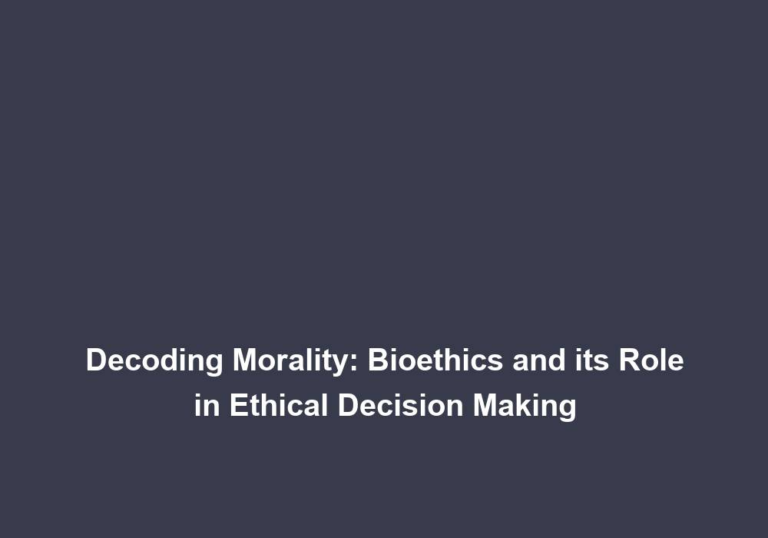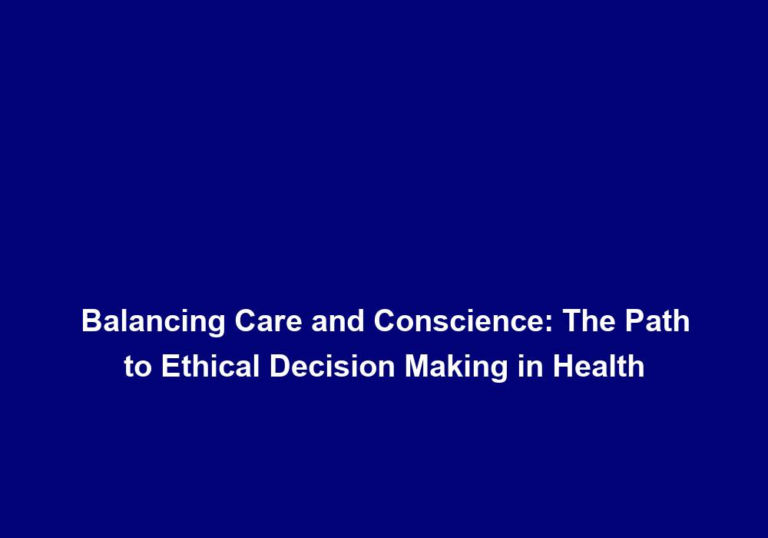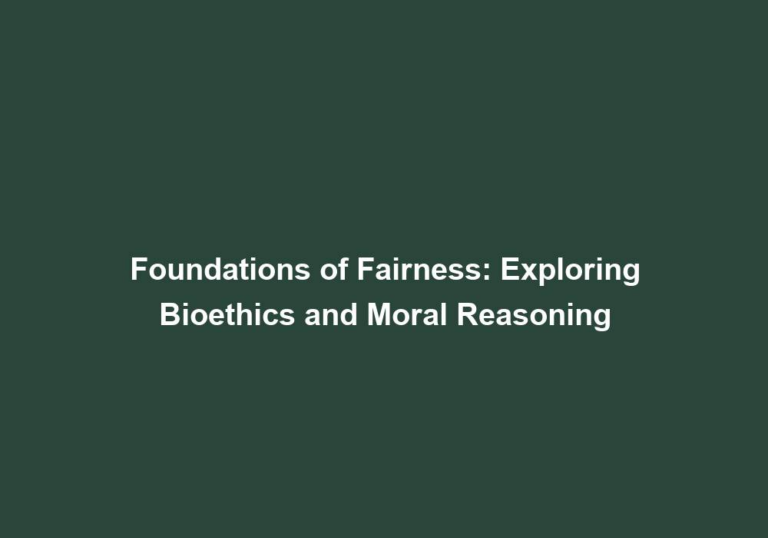At the Intersection of Life and Morality: Delving into Bioethics
Bioethics is a multidisciplinary field that explores the moral and ethical implications of advances in biology, medicine, and healthcare. It delves into the fascinating world of bioethics, examining its key principles, controversial topics, and the role it plays in shaping our society.
Understanding Bioethics
Bioethics encompasses a wide range of issues, addressing both practical and theoretical questions. It draws upon various disciplines, including philosophy, law, medicine, theology, sociology, and genetics. By analyzing the ethical dilemmas that arise from advancements in the life sciences, bioethics seeks to provide guidance for decision-making processes related to medical research, clinical practices, and the allocation of healthcare resources.
These ethical dilemmas often involve weighing the benefits and potential harms associated with certain actions, technologies, or policies. For example, when considering the development of a new medical intervention, bioethicists carefully assess the potential benefits it may offer while also minimizing the risks involved. They consider factors such as the impact on patients’ well-being, the possibility of harm, and the overall societal implications.
Key Principles of Bioethics
1. Autonomy
Autonomy is one of the fundamental principles of bioethics. It refers to an individual’s right to make decisions about their own body and healthcare. In the context of bioethics, autonomy emphasizes the importance of informed consent. This means ensuring that individuals have the necessary information to make autonomous choices regarding their medical treatment, participation in research studies, and end-of-life decisions.
To uphold the principle of autonomy, healthcare professionals and researchers must provide patients with clear and understandable information about their condition, available treatment options, and potential risks. The emphasis is on respecting patients’ rights to make decisions that align with their personal values, beliefs, and preferences.
2. Beneficence
Beneficence entails acting in the best interest of patients and promoting their well-being. Healthcare professionals and researchers have a moral obligation to provide appropriate care, avoid harm, and maximize benefits for those under their care. This principle guides the development of new medical interventions, ensuring that they offer potential benefits while minimizing risks.
To ensure beneficence, healthcare providers must continuously evaluate the effectiveness and safety of medical interventions. They also need to consider the individual needs and preferences of each patient, tailoring their approach to provide the best possible care. This may involve considering alternative treatments, exploring options for pain management, or addressing any potential conflicts of interest.
3. Nonmaleficence
Nonmaleficence emphasizes the principle of “do no harm.” Healthcare professionals must strive to minimize the risks and potential harm associated with medical interventions. This principle prompts careful assessment of potential risks and benefits before implementing any medical procedure or treatment.
To uphold nonmaleficence, healthcare providers must ensure that they are well-informed about the latest evidence-based practices and adhere to established guidelines and protocols. They should also prioritize patient safety, taking appropriate precautions to minimize the risk of adverse events or complications.
4. Justice
The principle of justice requires the fair distribution of healthcare resources, ensuring equal access to medical care and the fair allocation of limited resources. It addresses issues such as healthcare disparities, the affordability of treatments, and equitable access to experimental therapies. Bioethics seeks to identify and address the underlying social, economic, and cultural factors that contribute to these inequalities.
To promote justice, bioethicists work towards developing policies and practices that aim to eliminate healthcare disparities and ensure equitable access to healthcare services. This may involve advocating for policy changes, supporting initiatives that improve healthcare access in underserved communities, and promoting transparency in resource allocation processes.
Addressing Controversial Topics
Bioethics often deals with controversial topics that challenge societal norms, ethical beliefs, and legal frameworks. Let’s explore some of the most debated issues within this field:
1. Reproductive Technologies
Advancements in reproductive technologies have raised ethical concerns surrounding topics such as in vitro fertilization (IVF), surrogacy, and genetic engineering. Bioethicists analyze the potential benefits and risks of these technologies, considering questions of personal autonomy, the welfare of the child, and the potential for creating designer babies.
Bioethicists consider the ethical implications of reproductive technologies by examining issues such as the right to reproductive autonomy, the welfare of the children born through these technologies, and the potential long-term consequences for society. They also delve into the ethical considerations surrounding genetic engineering, weighing the benefits of disease prevention and treatment against the potential risks and ethical concerns associated with manipulating the genetic makeup of individuals.
2. End-of-Life Decisions
End-of-life decisions, including euthanasia and physician-assisted suicide, are complex ethical issues addressed by bioethics. These topics involve determining the extent of an individual’s autonomy over their own death, while also considering the potential for abuse and the impact on healthcare providers.
Bioethicists engage in thoughtful discussions surrounding end-of-life decisions, considering the ethical, legal, and societal implications. They explore questions such as the right to die with dignity, the importance of preserving patient autonomy, and the potential impact on vulnerable populations. These discussions also involve examining the role of healthcare providers in supporting patients through the end-of-life process and ensuring that their decisions are informed and respected.
3. Organ Transplantation
The demand for organ transplantation far exceeds the supply, leading to ethical discussions around organ allocation, donation, and the use of living donors. Bioethicists explore ways to ensure fairness, avoid exploitation, and promote transparency in the allocation process.
Bioethicists delve into the ethical considerations surrounding organ transplantation, aiming to develop fair and just systems for organ allocation. They explore questions such as the criteria for determining eligibility, the role of living donors, and the importance of informed consent. They also address concerns related to organ trafficking, ensuring that the organ donation process is ethical and respects the autonomy and well-being of all parties involved.
4. Human Genetic Research
The rapid advancements in human genetic research pose ethical questions about privacy, consent, and potential discrimination. Bioethics plays a crucial role in establishing guidelines and regulations to protect individuals who participate in genetic research studies, ensuring their autonomy and privacy.
Bioethicists examine the ethical implications of human genetic research, ensuring that individuals’ rights and well-being are protected. They address concerns such as the privacy and confidentiality of genetic information, the importance of informed consent, and the potential for discrimination based on genetic characteristics. Through ethical guidelines and regulations, bioethics aims to safeguard the rights and dignity of individuals involved in genetic research.
The Role of Bioethics in Society
Bioethics plays a vital role in shaping public policy, influencing medical and research practices, and fostering public discourse on ethical issues. It provides a framework for evaluating the ethical implications of new technologies, guiding decision-making in healthcare institutions, and informing legislation on contentious topics.
Furthermore, bioethics committees and review boards are established to assess research proposals and guide ethical conduct in scientific studies involving human subjects. These committees ensure that research studies adhere to the principles of autonomy, beneficence, nonmaleficence, and justice.
Bioethics also serves as an educational tool, fostering critical thinking and ethical awareness among healthcare professionals, researchers, and the general public. By addressing controversial topics and promoting open dialogue, it encourages society to reflect on the ethical dimensions of scientific advancements and make informed decisions.
Conclusion
Bioethics serves as a critical bridge between the realms of science, medicine, and ethics. By exploring the moral and ethical implications of biomedical research, clinical practices, and healthcare policy, it helps society navigate complex decisions at the intersection of life and morality. Through its principles, it ensures the protection of individual autonomy, promotes the well-being of patients, and strives for justice in the allocation of healthcare resources. As we continue to witness rapid advancements in the life sciences, bioethics will play an increasingly crucial role in guiding our choices and shaping the future of healthcare.







